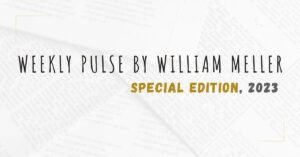The Weekly Pulse is my content curation and my highlights from readings, books, podcasts, insights, and everything I discovered during the week.
So, let’s go with some discoveries from the week!
#1 – The Discipline of Innovation
#2 – The Real Meaning of Freedom at Work
#3 – The Ivy Lee Method: Daily Routine Experts Recommend for Peak Productivity
#4 – 10 Things Your Corporate Culture Needs to Get Right
#5 – The Feedback Fallacy
The Discipline of Innovation
Source: Harvard Business Review
Author: C.K. Prahalad and Gary Hamel
Summary: In the hyper competition for breakthrough solutions, managers worry too much about
characteristics and personality. A commitment to the systematic search for imaginative and useful ideas is what successful entrepreneurs share —not some special genius or trait. The key is to know where to look.
3 Highlights:
“… In innovation, as in any other endeavor, there is talent, there is ingenuity, and there is knowledge. But when all is said and done, what innovation requires is hard, focused, purposeful work. If diligence, persistence, and commitment are lacking, talent, ingenuity, and knowledge are of no avail.…“
“… Innovation is work rather than genius. It requires knowledge. It often requires ingenuity. And it requires focus. There are clearly people who are more talented innovators than others, but their talents lie in well-defined areas. Indeed, innovators rarely work in more than one area...”
“… Effective innovations start small. They are not grandiose…”
Access the full Weekly Pulse reading here >>
The Real Meaning of Freedom at Work
Source: The Wall Street Journal
Author: Adam Grant
Summary: The debate about whether work should be in-person, remote-first, or hybrid is too narrow. Yes, people want the freedom to decide where they work. But they also want the freedom to decide who they work with, what they work on, and when they work. Real flexibility is having the autonomy to choose your people, your purpose, and your priorities.
3 Highlights:
“… To give people the freedom to learn, we need to work harder to open doors…“
“… The biggest source of positive liberty may be the freedom to decide when and how much we work. If we’ve learned anything from the pandemic about going remote, it’s that people aren’t shirking from home—they’re working overtime...”
“… Flexible work is here to stay, but companies that resist it may not be. One of the biggest mistakes I saw companies make before Covid was failing to experiment with new forms of freedom. As employers contemplate a return to the workplace, a good place to start might be to ask people about the experiments they’ve run in the past year and a half and the ones they’d love to try moving forward…”
Access the full Weekly Pulse reading here >>
The Ivy Lee Method: Daily Routine Experts Recommend for Peak Productivity
Source: James Clear Site
Author: James Clear
Summary: During his 15 minutes with each executive, Ivy Lee explained his simple daily routine for achieving peak productivity. The Ivy Lee Method of prioritizing your to-do list seems stupidly simple. How could something this simple be worth so much?
3 Highlights:
“… It’s simple enough to actually work…“
“… It forces you to make tough decisions…”
“… It removes the friction of starting, and it requires you to single-task…”
Access the full Weekly Pulse reading here >>
10 Things Your Corporate Culture Needs to Get Right
Source: MIT Sloan Management Review
Author: Donald Sull and Charles Sull
Summary: Knowing what elements of culture matter most to employees can help leaders foster engagement as they transition to a new reality that will include more remote and hybrid work. What distinguishes a good corporate culture from a bad one in the eyes of employees? This is a trickier question than it might appear at first glance. Most leaders agree in principle that culture matters but have widely divergent views about which elements of culture are most important.
3 Highlights:
“… Understanding the elements of culture that matter most to employees can help leaders maintain employee engagement and a vibrant culture as they transition to the new normal...“
“… Identifying toxic leaders, digging deeper to understand the context of their behavior, coaching them, or removing them from leadership positions are tangible actions organizations can take to root out people who are undermining corporate culture and potentially exposing the company to reputational or legal risk…”
“… The strong and varied language employees use to describe disrespect suggests how deeply it affects them. Employees describe being demeaned and degraded; viewed as disposable cogs in a wheel or robots; or treated like children, second-class citizens, crap, garbage, dirt, trash, scum, idiots, or cattle…”
Access the full Weekly Pulse reading here >>
The Feedback Fallacy
Source: Harvard Business Review
Author: Marcus Buckingham and Ashley Goodall
Summary: For years managers have been encouraged to candidly praise and criticize just about everything workers do. But it turns out that feedback does not help employees thrive. It’s also not the opposite of failure. Managers will never produce great performance by identifying what they think is a failure and telling people how to correct it. Neuroscience shows that we grow most when people focus on our strengths.
3 Highlights:
“… How to give people feedback is one of the hottest topics in business today. The arguments for radical candor and unvarnished and pervasive transparency have a swagger to them, almost as if to imply that only the finest and bravest of us can face these truths with nerveless self-assurance, that those of us who recoil at the thought of working in a climate of continual judgment is condemned to mediocrity, and that as leaders our ability to look our colleagues squarely in the eye and lay out their faults without blinking is a measure of our integrity…”
“… We humans do not do well when someone whose intentions are unclear tells us where we stand, how good we “really” are, and what we must do to fix ourselves…”
“… Whenever you see one of your people do something that worked for you, that rocked your world just a little, stop for a minute and highlight it…”
Access the full Weekly Pulse reading here >>
Do you want to get new content in your Email?
I am incredibly grateful that you have taken the time to read this Weekly Pulse.
The Weekly Pulse is an important section of this website, aiming to share good stuff with you every week!
Do you want to explore more? Check more Weekly Pulse content here.
Check my main categories of content below:
- Agile
- Book Notes
- Career
- Leadership
- Management
- Managing Yourself
- Productivity
- Project Management
- Reading Insights
- Technology
- Weekly Pulse
Navigate between the many topics covered in this website:
Agile Art Artificial Intelligence Blockchain Books Business Business Tales Career Coaching Communication Creativity Culture Cybersecurity Design DevOps Economy Emotional Intelligence Feedback Flow Focus Gaming Goals GPT Habits Harvard Health History Innovation Kanban Leadership Lean Life Managament Management Mentorship Metaverse Metrics Mindset Minimalism Motivation Negotiation Networking Neuroscience NFT Ownership Paper Parenting Planning PMBOK PMI Politics Productivity Products Project Management Projects Pulse Readings Routines Scrum Self-Improvement Self-Management Sleep Startups Strategy Team Building Technology Time Management Volunteering Work
Do you want to check previous Weekly Pulse posts? Check the last couple of weeks:
- Weekly Pulse by William Meller | Special Edition, 2023
- Weekly Pulse by William Meller | Week 51, 2023
- Weekly Pulse by William Meller | Week 50, 2023
- Weekly Pulse by William Meller | Week 49, 2023
- Weekly Pulse by William Meller | Week 48, 2023
Support my work by sharing my content with your network using the sharing buttons below.
Want to show your support tangibly? A virtual coffee is a small but nice way to show your appreciation and give me the extra energy to keep crafting valuable content! Pay me a coffee:





